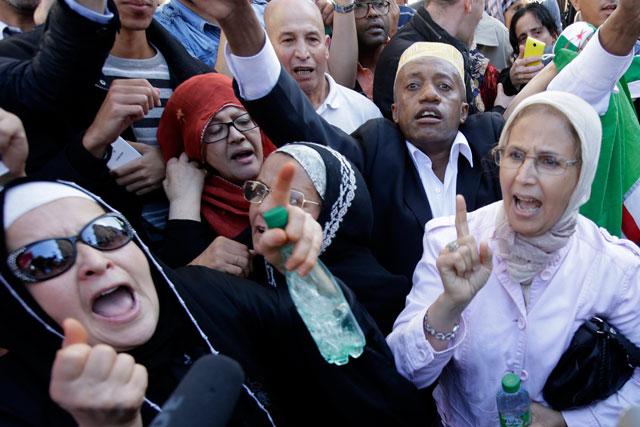You are here
Western Muslims, troubled, rally against extremism
By AP - Sep 27,2014 - Last updated at Sep 27,2014

PARIS — In tweets, in street gatherings and in open letters, moderate Muslims around the world are insisting that Islamic State extremists don't speak for their religion. Many are also frustrated that anyone might think they do, and a backlash has already begun.
Last week's videotaped beheading of a French mountaineer by militants linked to the Islamic State group prompted heartsick fury among Muslims in France and elsewhere in Europe, torn between anger at the atrocities committed in the name of Islam and frustration that they have to defend themselves at all.
Herve Gourdel was the fifth Western hostage decapitated in recent weeks by Islamic extremists — this time, the militants said, as revenge for France's decision to join air strikes against the Islamic State group.
The head of France's largest mosque called for Muslims to rally Friday in Paris to condemn Gourdel's slaying and show unity against terrorism, saying Islamic State's "deadly ideology" had nothing to do with Islam. Within hours of the call, the rector of the Bordeaux mosque, Tareq Oubrou, said French Muslims need not demonstrate in the name of Islam — but should be joined by everyone.
"They are doubly affected, because this crime touched one of our countrymen and because this crime was carried out in the name of our religion," Oubrou told RTL radio.
The same debate played out elsewhere. The hashtag campaign #notinmyname — or #pasenmonnom in French — initiated by British Muslims who wanted to show their opposition to extremist violence, spawned a #MuslimApologies backlash by those who thought the sense of regret was overwrought. Tweets "apologised" for algebra, soap and coffee.
"Nowhere does the Koran say other religions or nations must be attacked. Cutting people's heads off is really the most despicable. If air strikes can stop these fundamentalist, aggressive ideas from spreading, I am all for it," said 65-year-old Enes Mustafic.
Another congregant, Omer Jamak, questioned the devotion and even sanity of anyone who thought otherwise.
"According to Islam, nobody is allowed to be evil to others. Nobody has the right to do such a thing. I am against everything they do down there like every sane person is," Jamak said.
An online poll posted by France's Le Figaro newspaper, asking whether people thought the country's Muslim community had sufficiently denounced Gourdel's death, drew an infuriated response. Rachida Dati, the mayor of Paris' 7th arrondissement and the daughter of Algerian immigrants, called for an end to the "confounding of Islam and fundamentalism, as the French political class has done for too long". The paper on Friday apologised for what it called a "clumsy" question.
Dawud Walid, director of the Michigan chapter of the Council on American-Islamic Relations, said headlines about the Islamic State were often frustrating in his work. Walid said he's been speaking out against excessive force by police after the fatal shooting of a young black man in Ferguson, Missouri.
"I received calls and e-mails from fellow Americans who say, 'Why are you worried about what's going in Ferguson? Stop ISIS.' That is ridiculous," said Walid, a black Muslim.
"My primary responsibility as an American citizen is to try to make America more of a just place," Walid said. "People in Iraq and Syria can't even fix their own problems. What am I supposed to be doing from Detroit?"
Still, the banner at Friday's gathering in Paris honouring Gourdel was emblasoned with "Not in My Name" and many in the crowd of about 500 said they were dismayed and appalled.
"We all gathered today... to tell people, you want to convert, that's very good, but do it for your faith, because you want to convert and because you appreciate this religion. Don't do it to go fight, to go kill people because it is not what Islam says," said Nadir M'Sallaoui, a 27-year-old Parisian.
US Muslim leaders and scholars issued an open letter Wednesday denouncing Islamic State militants point by point, notably on "the killing of innocents" and jihad.
Muqtedar Khan, professor of political science at the University of Delaware and author of "American Muslims, Bridging Faith and Freedom", said Muslim condemnations after the 9/11 attacks failed to dent the reach of extremists.
"They are beginning to react the way they should have on September 12, 2001," Khan said. "Muslims have gotten really tired of these groups that bring nothing, that have no positive impact at all among their societies."
Khan said whether the protests take root will depend upon what happens when the beheadings have subsided, and Islamic State is no longer considered an immediate threat. Muslim leaders will have difficulty coming up with a message as attractive as the extremists' sermons to young people disillusioned with life in countries where they feel under constant suspicion. France's ban on face-covering veils and prohibitions on wearing headscarves in schools, for example, are often cited as proof the country is hostile to Muslims.
Speaking of the extremist preachers, Khan said: "Their theology becomes more potent because their politics are right."
Related Articles
Algerian troops found the body Thursday of French tourist Herve Gourdel, security sources said, months after he was beheaded by jihadists demanding that France halt air strikes against the Islamic State (IS) group.
Algeria's justice minister said Tuesday that some of the members of the group that kidnapped and beheaded a French hiker have been identified.
Algerian militants have beheaded French tourist Herve Gourdel, who was kidnapped by gunmen on Sunday in what the group said was a response to France's action against Islamic State militants in Iraq.
















